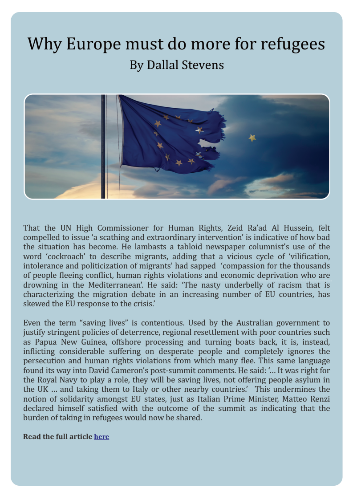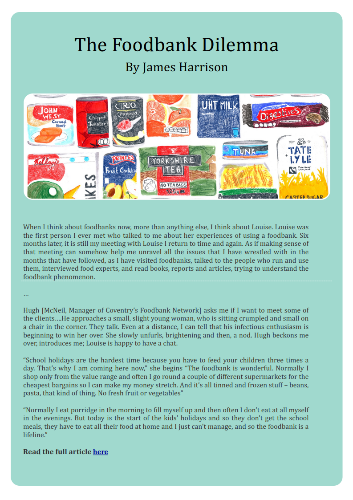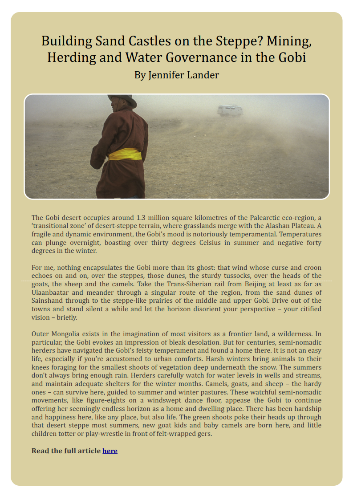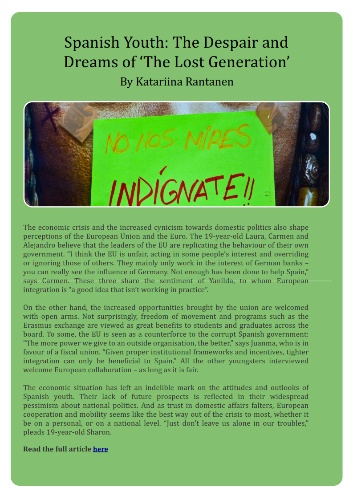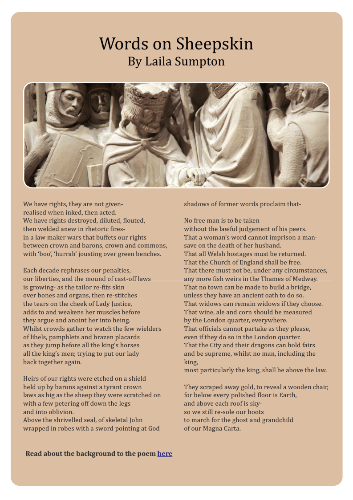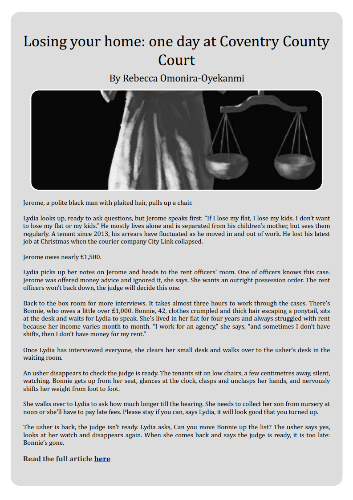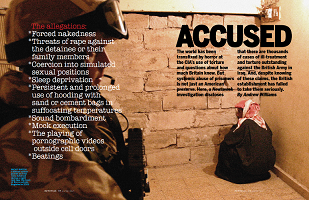Writing Wrongs Resources
The following are extracts from the Centre for Human Rights in Practice's online magazine, Lacuna, followed by a brief discussion with each of the authors about why they write. These will hopefully inspire and motivate you in your own social justice writing projects.
A panel discussion led by Anil Awesti with Christopher Davis, James Harrison and Andrew Williams.
You may find the following resources useful when thinking about the concept of identity:
An article featured in The Guardian by Riz Ahmed on being 'Typecast as a Terrorist';
An essay in Africa is a Country by Binyavanga Wainaina on being a homosexual mum;
An article featured in The Telegraph by Ava Vidal on 'Intersectional Feminism';
An article featured in The Body is Not an Apology by Cara Liebowitz on 'Identity-First Versus People-First Language';
A teaser video for the documentary 'We Are Poets';
The Reith Lectures by Kwame Anthony Appiah, which this year focus on the topic of identity;
Chiamamanda Ngozi Adiche, Americanah (2013);
Virginia Woolf, A Room of One’s Own (1929);
Nikesh Shukla, The Good Immigrant (2016);
Caitlin Moran, How to be a woman (2011);
Margo Jefferson, Negroland (2016);
Juliet Jacques, Trans: a memoir (2015);
Zaiba Malik, We are a Muslim Please (2010);
Riad Sattouf, The Arab of the Future (2015);
The Promise, Channel 4 Drama (2011).
Becoming a journalist - FAQs
Q. Do I need a degree in journalism?
A. No, but if you want to study journalism at university there are a range of NCTJ-accredited courses here. If you want to study another subject at university you can take an NCTJ-accredited journalism diploma afterwards (which can range from 18 weeks to a year in length). If, for example, you want to be a science journalist, you’ll probably find it more helpful to study science to degree level before taking a post-graduate journalism diploma later. Similarly, if you want to work abroad (and even if you don’t), you may find it more helpful to study another language than to study journalism at university.
Q. What training will I need?
A. The National Council for the Training of Journalists (NCTJ) is probably the most popular route, offering training in a range of different schools of journalism (broadcast, print, magazine, sports, production and freelancing). One of the most popular routes to a first job in journalism is via a post-graduate diploma. You’ll be marked in four areas:
- essential journalism skills,
- a portfolio of work,
- ethics and regulation, and
- media law.
You’ll also have the chance to learn elective skills such as PR or videography. You’ll need to complete modules in law, shorthand and public affairs if you want to progress to the National Qualification in Journalism, which can be taken after you’ve spent 18 months working as a trainee.
Q. Where can I train and how much will it cost?
A. NCTJ-accredited courses are offered at different centres around the country and there are distance learning options too. Fees depend on the centre and the length of the course but start from £450 for distance learning to more than £1,000, but there are programmes that can help to cover the cost of training.
Q. Can I get any financial support while I train?
A. The Journalism Diversity Fund and George Viner Memorial Fund encourage people from ethnically and socially diverse backgrounds to train as journalists so that newsrooms can better reflect the communities they serve. If you meet the selection criteria and can’t afford to attend a course you can apply for a bursary to cover your costs. Find out more here http://www.journalismdiversityfund.com/ and here https://www.nuj.org.uk/rights/george-viner-memorial-fund/
Q. How much do journalists earn?
A. There are many reasons to take a job in journalism but a high-paying salary isn’t usually one of them. The odds are stacked up against you striking the jackpot as a top columnist or BBC stalwart (Jeremy Vine is reportedly earning more than £700,000) and starting salaries are notoriously low (minimum wage) but there is opportunity to progress and make a decent living doing something you love.
News agencies (who sell stories to the nationals and magazines) are renowned for low pay but offer opportunities to cover national stories, make contacts on national newspapers and sometimes get bylines (your name on the top of a published story) which are essential for building up a portfolio of cuttings. Broadcast journalism jobs tend to be better paid than print jobs in regional press and managerial roles can also pay well.
At the time of writing (Jan 2018) a quick search can find a broadcast journalist job at BBC Gloucester at approx. £28K, a senior clinical editor job on a nursing magazine at £32k and a press officer at the Ministry of Justice at up to £37k. Many journalists find work in PR, communications, marketing, copywriting and teaching.
Q. Where can I find journalism jobs?
A. Here are a list of sites where you can find journalism vacancies. Take a look so you can see what’s currently available and understand the qualifications or experience they demand.
http://holdthefrontpage.co.uk/
https://www.journalism.co.uk/media-reporter-jobs/s64/
Feature writing – top tips
A feature can be anywhere between 800 and 7,000 words. Generally, newspaper and magazine features tend to be around 1,000-2,000.
Before you start writing, do your research. What has already been written on this subject? What new angle/perspective are you bringing?
Here are some of the key ingredients of a feature:
- It has a beginning, a middle and an end.
- It includes answers to the questions: “Who?”, “What?”, “Where?”, “Why?”, “When?” and “How?”
- There is background information, possibly including statistics and/or reports, giving the subject some context and showing that the writer has done their research.
- There are often quotes, which may have come from an interview conducted by the author. If you have sourced quotes from a report or another interview, make sure you reference the source (and include a link if possible).
- A feature usually includes a range of voices, ideas and perspectives. They consider conflicting viewpoints and can include the voices of experts, politicians, activists and the general public.
- Imagery is often used in features to set a scene or paint a picture. It’s a way of transporting the reader to another place or time to help them better understand the issue.
- A huge ream of plain text is off-putting to readers to supporting media is a crucial element. Produce or find (royalty-free) images, video footage, audio recordings, infographics and/or relevant links to enrich your story.
Finally, some top tips for the writing process:
- Get rid of jargon. We speak in shortcuts and acronyms for ease, but cut these out of your writing to make sure your feature can be understood by an expert as well as an absolute newcomer to the subject.
- Get rid of half your first draft. Writing often feels precious to the author, but it’s important to put your own feelings to one side so that you can consider the needs of the reader. Cut out any words or sentences that don’t add something vital to the direction of the feature.
- Fact check. If you have stated something as a fact, quote a reliable source (or add a link, where possible) so that your reader isn’t left questioning. Double check any numbers you’ve added (it’s easy to add or leave out zeros, decimal points and percentage marks!).
- Step away from it. When writing features it’s easy to become too embroiled and personally invested in the issue. Leave yourself time to take a break so that you can forget all about it for an hour/day/week, and then return to it with fresh eyes.
- Show it to someone else. Every writer - even the most experienced professional - needs an editor. A new pair of eyes will pick up on spelling errors and other mistakes that the author has missed. A new reader should also help you gauge whether your feature is interesting and comprehensive.

